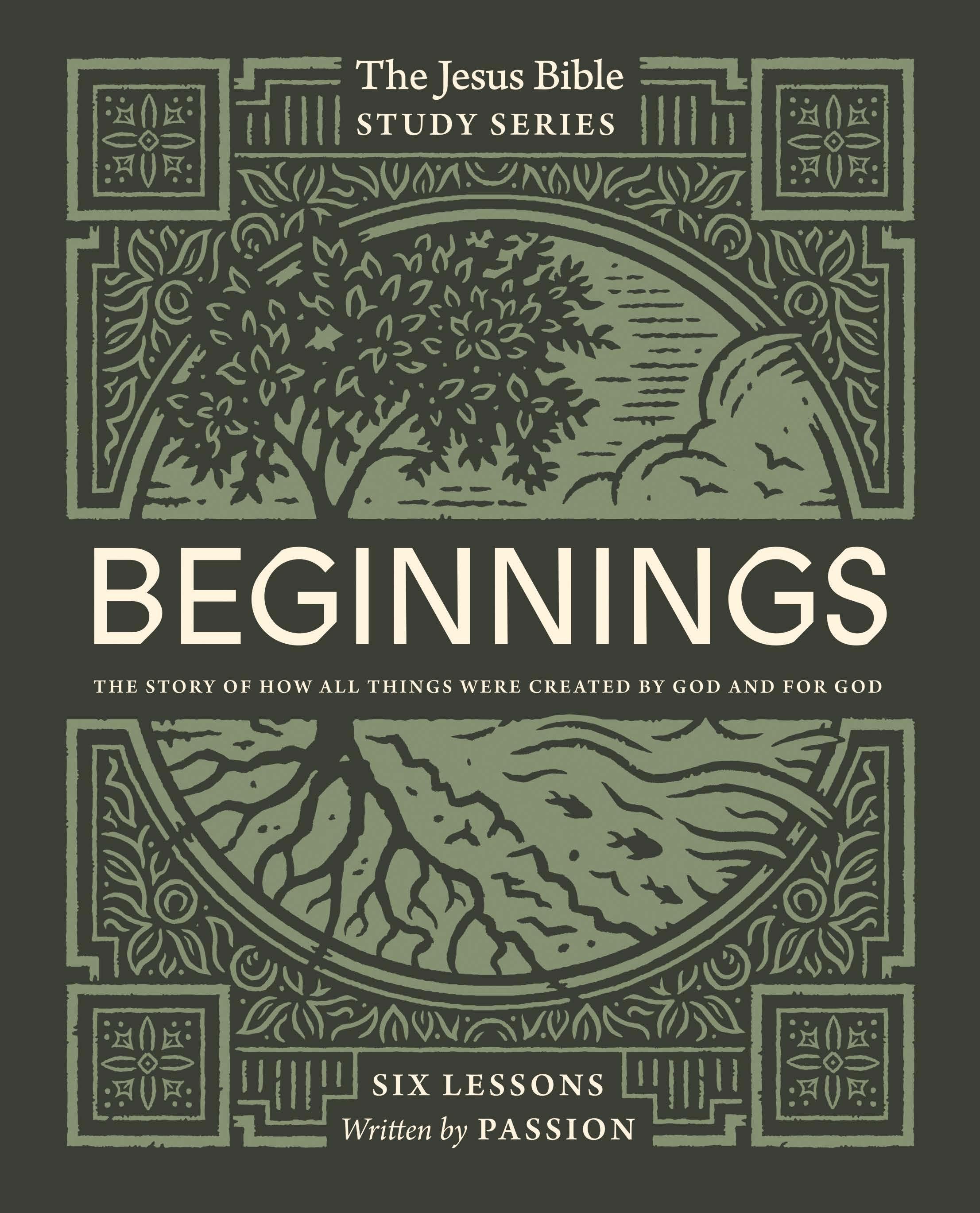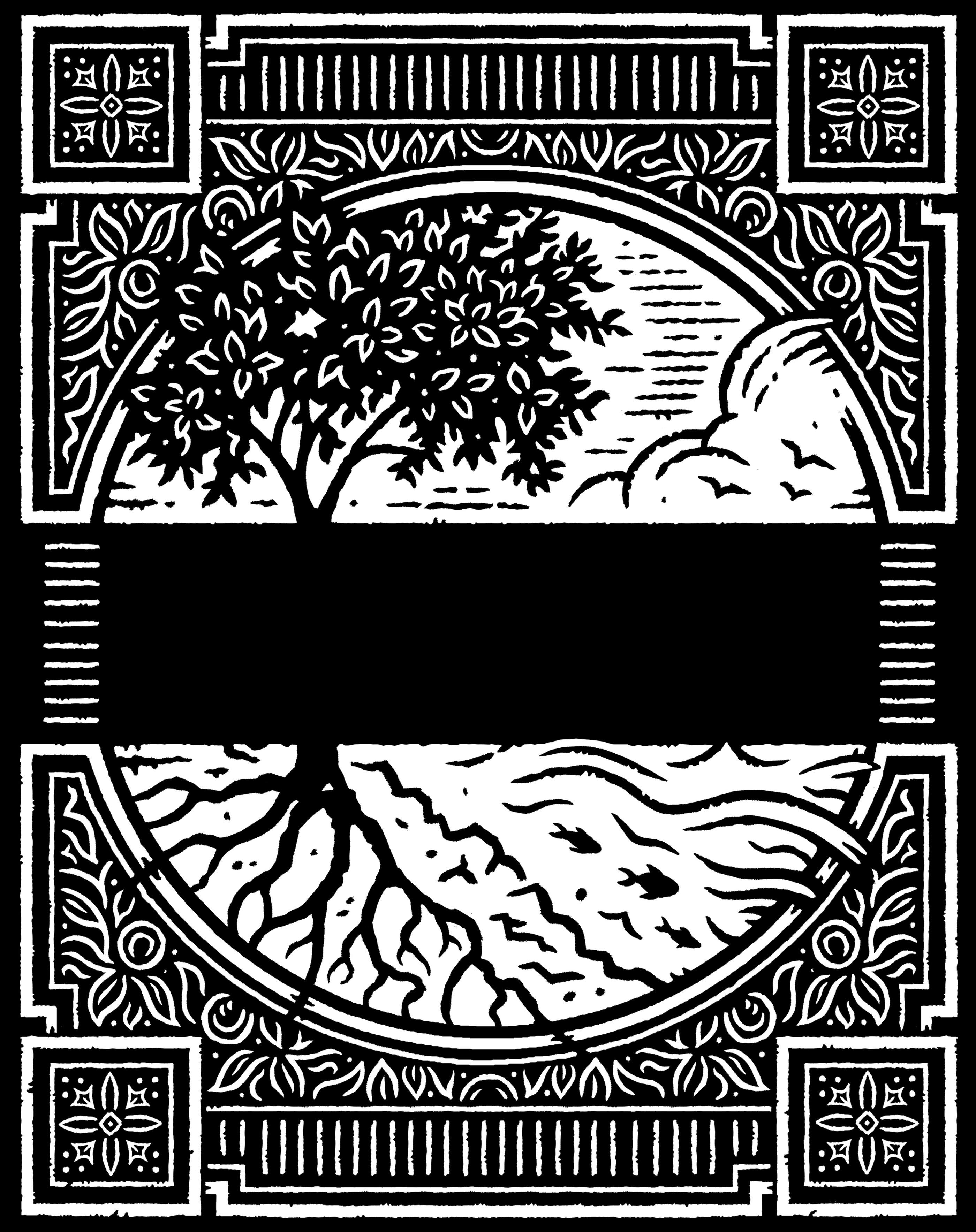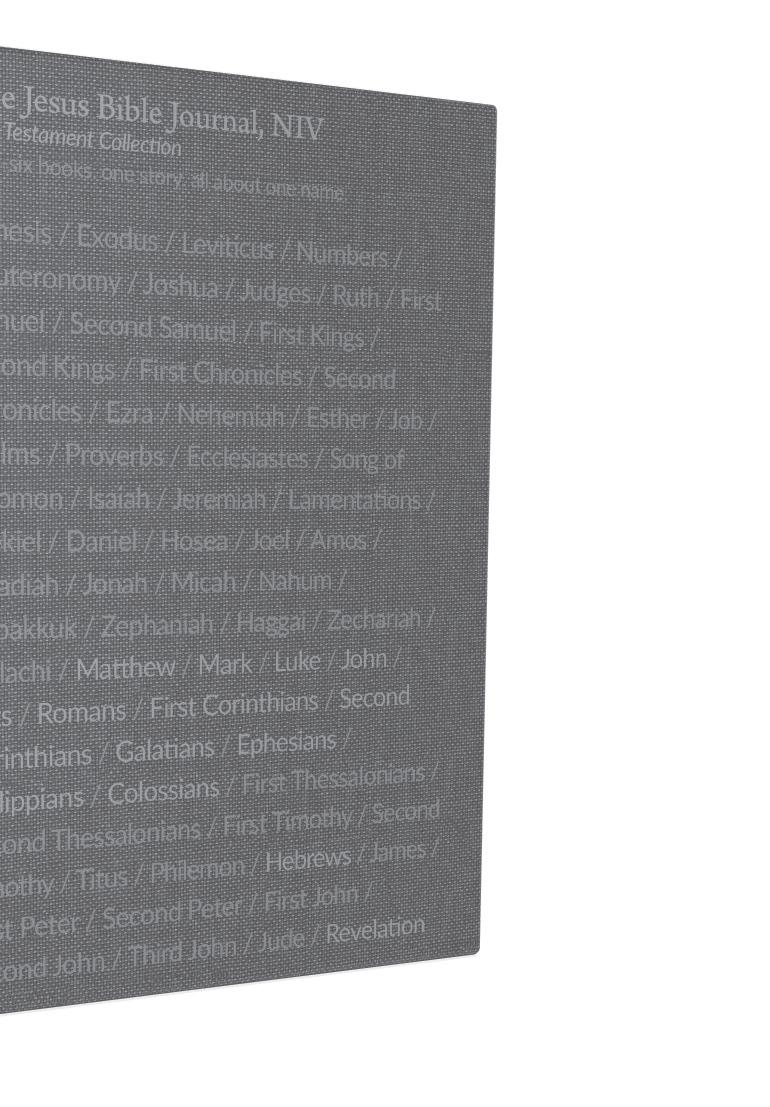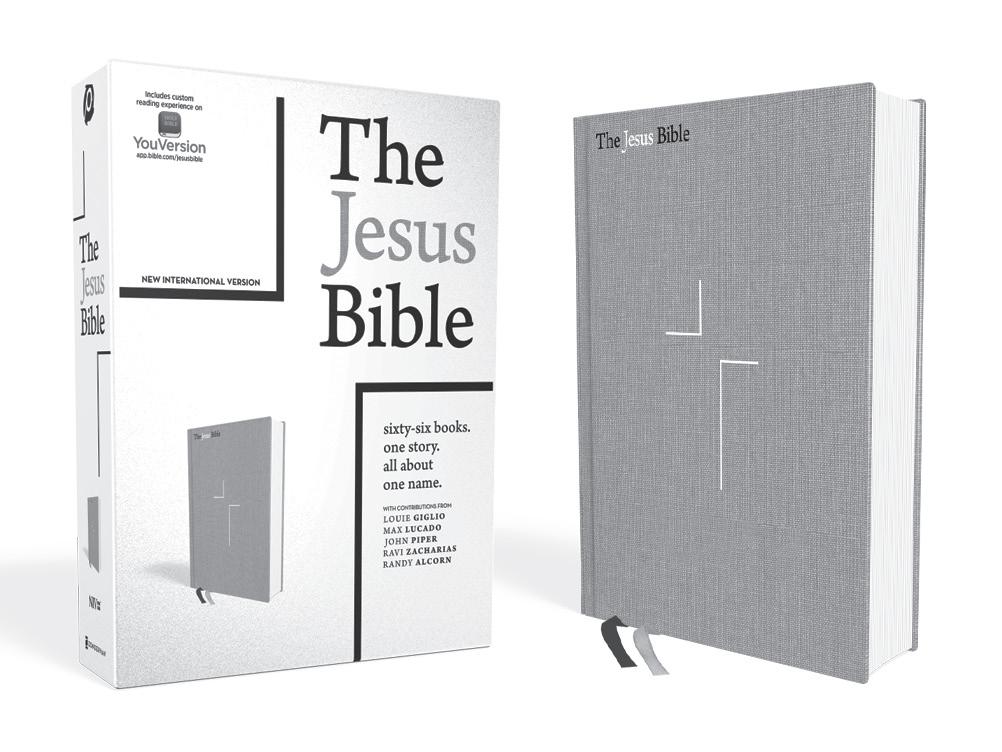
 Writer & General Editor of The Jesus Bible
Writer & Lead Writer of The Jesus Bible
Writer & General Editor of The Jesus Bible
Writer & Lead Writer of The Jesus Bible
STUDY GUIDE | SIX SESSIONS
BIBLE
Matt Rogers
Series
Aaron Coe
STUDY SERIES THE STORY OF HOW ALL THINGS WERE CREATED BY GOD AND FOR GOD
Series
BEGINNINGS The Jesus Bible
Beginnings Bible Study Guide
© 2022 by Passion Publishing
Requests for information should be addressed to: HarperChristian Resources, 3900 Sparks Dr. SE, Grand Rapids, Michigan 49546
ISBN 978-0-310-15498-3 (softcover)
ISBN 978-0-310-15499-0 (ebook)
All Scripture quotations are taken from the Holy Bible, New International Version®, NIV®. Copyright ©1973, 1978, 1984, 2011 by Biblica, Inc.™ Used by permission of Zondervan. All rights reserved worldwide. www.zondervan.com. The “NIV” and “New International Version” are trademarks registered in the United States Patent and Trademark Office by Biblica, Inc.™
Any internet addresses (websites, blogs, etc.) and telephone numbers in this book are offered as a resource. They are not intended in any way to be or imply an endorsement by HarperChristian Resources, nor does HarperChristian Resources vouch for the content of these sites and numbers for the life of this book.
All rights reserved. No part of this publication may be reproduced, stored in a retrieval system, or transmitted in any form or by any means—electronic, mechanical, photocopy, recording, or any other—except for brief quotations in printed reviews, without the prior permission of the publisher.
HarperChristian Resources titles may be purchased in bulk for church, business, fundraising, or ministry use. For information, please e-mail ResourceSpecialist@ChurchSource.com.
First printing December 2022 / Printed in the United States of America
CONTENTS Introduction v Lesson 1: Creation 1 Lesson 2: The Trinity 15 Lesson 3: Imago Dei ...................................................... 31 Lesson 4: Uniqueness 47 Lesson 5: Work ............................................................ 63 Lesson 6: Community .................................................... 79 Leader’s Guide .............................................................. 95 About the Authors 99
INTRODUCTION
You have a story. Everyone does.
And while your story is unique, all of our stories are alike in some ways.
Every story has a beginning. We were born on a specific date and in a particular place in the world. From that time, we began to grow and emerge into the people we are today.
We also all have an end. There will be a date in the future—one that we do not yet know—when our time on this earth will be finished. These dates of our birth and death serve as the first and last pages of the story of our lives.
Yet that is likely where our similarities end. Our births were not all the same. Some of us were given to two parents who marked our birth with a steady stream of pictures, praise, and parties. Others among us never knew our parents and emerged into the world with little fanfare. We spent time in cities that ranged from cosmopolitan hubs to rural mill villages. Our education and development were markedly altered as a result of the place we called home.
While common themes are found in everyone’s story, no two people experience the same set of joyful circumstances or painful events. The start of a relationship, birth of a child, and reunion with an old friend are only a few of the joyful factors that inform the chapters of our lives—while divorce, tragedy, and addiction represent just a few of the painful factors that will also inform our lives. And though we will all die, the details of our death will differ as well. Some of us will live to a ripe old age and pass from this life surrounded by our closest family and friends, while others of us
v
will face an untimely death. Sadly, some of us may even leave a legacy of pain and destruction in our wake.
You live your story. Yet it’s likely that on most days, you have found it hard to figure out exactly where your story is going. You might be thinking that your life is a little off. You might be wondering, “What is the purpose in it all?” You might be questioning some of the pain you have experienced, or some of the poor choices that you’ve made, or battling a nagging sense of anxiety about what is coming in the days ahead.
The reality is that you cannot understand the meaning of your life apart from Jesus. The only way to understand your story is by connecting it to a larger story.
God’s story isn’t like the one that you have. For one thing, you can already know the beginning and ending of God’s story and all the major details in between. You can know who God is, what he is like, and what he is doing in the world. You can know why he created all things—including you —and how he is going to save sinners and fix a broken world.
God’s story also differs from your own because it never changes. You don’t have to worry that some unforeseen event is going to divert God’s plan or change his mind. God, because he is gracious, reveals his unchanging story to you through the Bible.
It might be helpful to think of the story of Scripture as being told through six main acts: (1) Beginnings, (2) Revolt , (3) People, (4) Savior, (5) Church, (6) Forever. Every detail in the Bible can be placed into one of these six acts. They tell God’s story from beginning to end.
This study, Beginnings, is designed to usher you through the first act of God’s story, which is revealed most fully in the opening two chapters of the book of Genesis. Later biblical authors also wrote about God’s creation and the purposes behind his work, so we will pull from those portions of Scripture as well as we go along.
Throughout Beginnings, you will discover that your story begins with a creating God. The text of the Bible underscores that you are created in his image. Your origination was thus in the mind of a majestic God. Everything beautiful, spiritual, wonderful,
vi Beginnings
and eternal about you is the result of his divine image woven into your spirit from the start.
You will also see how the triune God worked through the Son to bring about the creation of everything. “For in [Jesus] all things were created: things in heaven and on earth, visible and invisible, whether thrones or powers or rulers or authorities; all things have been created through him and for him” (Colossians 1:16). In the beginning, Jesus created everything.
Our prayer is that Beginnings will be far more than just another Bible study. It is our hope that as you start to grasp God’s greater story, you will begin to make greater sense of the story of your life. It is also our goal that you will come to understand the amazing truth that God has actually included you in his story ! From the dawn of creation, he was thinking of you and designed your life to play a key role in the outworking of the story he’s writing.
His story is best understood from the beginning. So that’s where we’ll start.
In the beginning . . .
— AARON & MATT
vii Introduction
Lesson 1
CREATION
In the beginning God created the heavens and the earth.
GENESIS 1:1
For in [Jesus] all things were created: things in heaven and on earth, visible and invisible.
COLOSSIANS 1:16

By the word of the L ord the heavens were made . . .
— PSALM 33:6
WELCOME
Many books, movies, poems, and speeches are famous for their opening lines. I’m guessing that when I say the phrase, “A long time ago in a galaxy far, far away .” you immediately think of Star Wars. Or when I say the line, “Four score and seven years ago our fathers brought forth on this continent a new nation . . .” you recognize it as President Lincoln’s opening line to the Gettysburg Address, one of the most important speeches in American history.
Opening lines set the context. They help the audience know where the story is going. Additionally, and perhaps more importantly, opening lines of a story help the reader understand the magnitude of what is about to be discussed.
For instance, when Abraham Lincoln delivered the Gettysburg Address, he knew he would have to grab his listeners’ attention quickly. His speech was to follow several hours of dialogue from other speakers on that day—including a two-hour oration about the Battle of Gettysburg and its significance. Lincoln understood that if his audience was going to grasp the gravity of the situation, they would do so in the first few words that he spoke.
In the same way, the God of the universe—who exists in eternity and has no beginning or ending—entered into the space and time of human history with these attentiongrabbing words: “In the beginning God created the heavens and the earth” (Genesis 1:1). These opening words of Scripture convey the scene at the dawn of creation where we first encounter an eternal God hovering over a formless expanse. There was nothing—except God.
3
Into the void, God spoke. His words thundered with power. “And God said, ‘Let there be light,’ and there was light” (verse 3). His words were not like the frail and insignificant words that we humans often use. They were mighty and strong—powerful enough to bring beauty from chaos and light from darkness. At the sound of his voice, creation burst to life.
1. When was the last time you were overwhelmed by the beauty, power, or majesty of something? What was it? How did it make you feel and how did you respond?
READ God’s Power in Creation
The disciple John would later point to the magnitude of God’s creative work when he wrote in his Gospel, “Through him all things were made; without him nothing was made that has been made” (John 1:3). All things. God made everything. There’s nothing in all the universe that was not intricately crafted by him. God often reminded his people throughout the Scriptures of the majesty of his creation. We see this in the story of Job, an Old Testament saint who suffered mightily. As the following passage relates, he was given a picture of God’s power at creation, and God reminded him that there was much more to his story than he alone could grasp.
4 Beginnings
1 Then the Lord spoke to Job out of the storm. He said:
2 “Who is this that obscures my plans with words without knowledge?
3 Brace yourself like a man; I will question you, and you shall answer me.
4 “Where were you when I laid the earth’s foundation? Tell me, if you understand.
5 Who marked off its dimensions? Surely you know! Who stretched a measuring line across it?
6 On what were its footings set, or who laid its cornerstone—
7 while the morning stars sang together and all the angels shouted for joy?
8 “Who shut up the sea behind doors when it burst forth from the womb,
9 when I made the clouds its garment and wrapped it in thick darkness,
10 when I fixed limits for it and set its doors and bars in place,
11 when I said, ‘This far you may come and no farther; here is where your proud waves halt’?
12 “Have you ever given orders to the morning, or shown the dawn its place,
13 that it might take the earth by the edges and shake the wicked out of it?
14 The earth takes shape like clay under a seal; its features stand out like those of a garment.
15 The wicked are denied their light, and their upraised arm is broken.
5 Creation
16
“Have you journeyed to the springs of the sea or walked in the recesses of the deep?
17 Have the gates of death been shown to you? Have you seen the gates of the deepest darkness?
18 Have you comprehended the vast expanses of the earth? Tell me, if you know all this.
19 “What is the way to the abode of light? And where does darkness reside?
20 Can you take them to their places? Do you know the paths to their dwellings?
21 Surely you know, for you were already born! You have lived so many years!
2. How does God describe his power to Job in these verses?
Job 38:1–21
6 Beginnings
3. What does this passage reveal about the way God cares for his creation?
Maker of Heaven and Earth
The writers of Scripture continually described God as “the Maker of heaven and earth” (Psalm 146:6). The authors point to this truth more than 100 times in the Bible. The church made a similar claim in its earliest creeds. The Apostles’ Creed begins with these words: “I believe in God the Father, Almighty Maker of heaven and earth.” The early church understood that a foundational claim of the Christian faith rests on the fact that the God we worship made all that exists. His creation is grand because it’s a reflection of his character. In fact, as the following passage relates, creation is meant to point back to the Creator and declare his excellence.
18 The wrath of God is being revealed from heaven against all the godlessness and wickedness of people, who suppress the truth by their wickedness, 19 since what may be known about God is plain to them, because God has made it plain to them. 20 For since the creation of the world God’s invisible qualities—his eternal power and divine nature—have been clearly seen, being understood from what has been made, so that people are without excuse.
21 For although they knew God, they neither glorified him as God nor gave thanks to him, but their thinking became futile and their foolish hearts were darkened. 22 Although they claimed to be wise, they became fools 23 and exchanged the glory of the immortal God for images made to look like a mortal human being and birds and animals and reptiles.
7 Creation
Therefore God gave them over in the sinful desires of their hearts to sexual impurity for the degrading of their bodies with one another. 25 They exchanged the truth about God for a lie, and worshiped and served created things rather than the Creator—who is forever praised.
Romans 1:18–25
4. What does Paul say we should be able to learn about God from his creation?
5. Why do you think it is so important for the church to continually remember that God is the Creator? Why does this matter for the Christian faith?
24
8 Beginnings
REFLECT
Focus on the Creator
“Every good and perfect gift is from above, coming down from the Father of the heavenly lights” (James 1:17). Unfortunately, much like kids on Christmas morning who look past their parents’ generosity to the gifts themselves, we are prone to look right past the most significant aspect of creation and become enamored by the goodness of created things.
Certainly, there is much to love about the world God made. But what’s truly spectacular about creation isn’t actually creation at all—not the vast oceans, sprawling mountain ranges, or stunning sunsets. Those same oceans can erupt in tumultuous storms. Those mountains can crumble. That sun can be shrouded in clouds. What should inspire awe and wonder is the One who made it all—not only the creation itself, but also the Creator.
This very exchange—creation for Creator—lies at the core of all human sin. As Paul wrote in Romans 1, sinful people worship and serve the creature rather than the Creator. They discount or deny the Maker of heaven and earth and worship his handiwork—whether it’s money, relationships, work, art, power, sports, science, or any other created thing. Every sin we’ve ever committed results from this exchange.
Think about how this plays out in business. People take the creativity they’ve been given by God and the beauty of the world he’s made and use it to build lives that revolve around financial gain, creating structures that celebrate rebellion from God. Some do the same with their families. A spouse and children are great gifts—a clear demonstration of God’s love and kindness. But no person, not even a family member, is meant to take God’s place in our lives. If we choose to revolve our lives around our families, selfishly pursuing our private happiness and measuring the quality of our lives based on our families’ wellbeing, we turn God’s gifts into cheap substitutes for the gift-provider himself.
If it is true that all human failure and brokenness results from loving the creation more than the Creator, then the most important thing we can do is remind ourselves of who this Creator is and what he is like. This is a far better starting point than where we
9 Creation
typically start. When we realize we’ve blown it and decide it’s time to get our act together, we’re prone to rely on our efforts and self-justification to try and earn our way back to God by our own merit.
We aren’t going to start Beginnings with our view of our mistakes, regrets, and works. Rather, we are going to begin with our view of God. Our sins and failures result from a weak view of our Creator and a misguided love for the things he has made. So, we are going to begin with God—his greatness and his power. The more we glimpse the greatness of God, the more he transforms our lives into all he intended for us to be.
6. How are you tempted to love creation more than the Creator?
7. How are you using the gifts and talents God has provided to you for his glory, rather than only for earthly means?
10 Beginnings
Consider the Creator
The psalmist wrote, “May the glory of the Lord endure forever; may the Lord rejoice in his works—he who looks at the earth, and it trembles, who touches the mountains, and they smoke” (Psalm 104:31–32). Our world doesn’t talk a lot about glory (at least, not rightly), but it’s a concept we intuitively understand. Glory should capture our attention, cause us to gasp in awe, and overwhelm us with beauty or intricacy.
There’s no real earthly comparison for God’s glory. Even the first glimpse of a bride on her wedding day, the feeling you get when you stand on the rim of the Grand Canyon, or the view of the sun dipping below the horizon are nothing compared to the glory of God. Everything God made—all rolled into one big package—testifies to the glory of who he is. That’s the point of creation—to inspire awe at the glory of the Creator.
You’ve probably had an experience like this at some point in your life. Maybe you were staring up at a star-filled sky or walking the shore of the beach. Deep inside, you were gripped by a sense of something bigger, more profound, and more powerful than you could see with your eyes. This “something” wasn’t actually a thing but a person
It was God.
Not only is it amazing to consider that God made everything, but it’s also stunning to think about how he created it. God did not create like we do. People take existing material—things like instruments or wood—and use them to shape something else. We call it a new creation but, in reality, we’ve merely taken the existing creation and repackaged it.
God did something altogether different. He took nothing and made something. Scholars often refer to this as ex nihilo. You don’t have to know Latin to guess at the meaning of that phrase—he made “out of nothing.” The author of the book of Hebrews captures it this way: “What is seen was not made out of what was visible” (Hebrews 11:3). Talk about glory! Anyone who can make something out of nothing is glorious.
This answer to the “how” question continues to perplex many who read Scripture and are prone to want more details about exactly how God created. Using modern science as a guide, some want the Bible to read like a textbook, outlining the intricate
11 Creation
details of the process God used to create all that is. There may be a time and place for such inquiry, but this is certainly not primary in the minds of the authors of Scripture. Instead, God intended us to know that he created out of nothing in order to show his glory. That’s it.
8. What aspects of creation make you think there is, or might be, a Creator?
9. What can you learn about the Creator from what he has made?
CLOSE
God’s creation is quite impressive (and that’s an understatement!). The world is beautiful —from intricately designed flowers to countless majestic galaxies we are still discovering. God made the world extravagant and orderly —built to run in a certain way, making it possible for humans to mine the depths of God’s wisdom through science. Creation is complex—astounding the greatest minds throughout human history.
Every aspect of creation reveals the sheer majesty of the glory of God. A glorious God made a good world. Long before sin distorted the earth, it was filled with peace, harmony, joy, beauty, and all other realities that we wish were true of the world in which we live. The broken world we experience is a far cry from Eden. The created world is broken—not because of an inherent fault in the Creator’s design, but because of human failure and sin.
12 Beginnings
But human sin is no match for the power of the Creator! He is intent on his glory being seen, known, and worshiped. Sin is no match for someone powerful enough to speak all things into existence. And it’s this God—the Maker of the heavens and earth—who is pursuing you with his love. He has promised that a day is coming when “the earth will be filled with the knowledge of the glory of the Lord as the waters cover the sea” (Habakkuk 2:14).
The waters cover the sea completely—there’s no part of the sea not covered by water. Such will be true of our world. Currently, the glory of God is on display in his created world, though many fail to recognize him as the Creator. One day, there will be no mistaking his glory. It will be clearly seen and known throughout his world. We live in a time when sin and brokenness seem to prevail—but this is the time before God’s glory will be seen by everyone.
It’s vital that we rightly understand who God is and what He is doing in the world in the space between what is and what will one day be. We’ll talk about that more in our next session.
10. Does God’s involvement in the details of creation give you confidence in his involvement in the details of your life? How?
11. Just as all of creation is a reflection of God’s glory, how can you be a reflection of his greatness this week?
13 Creation



sixty-six books. one story. all about one name.
sixty-six books. one story. all about one name.
sixty-six books. one story. all about one name.


The Jesus Bible, NIV & ESV editions, with feature essays from Louie Giglio, Max Lucado, John Piper, and Randy Alcorn, as well as profound yet accessible study features will help you meet Jesus throughout Scripture.
The Jesus Bible, NIV & ESV editions, with feature essays from Louie Giglio, Max Lucado, John Piper, and Randy Alcorn, as well as profound yet accessible study features will help you meet Jesus throughout Scripture.
The Jesus Bible, NIV & ESV editions, with feature essays from Louie Giglio, Max Lucado, John Piper, and Randy Alcorn, as well as profound yet accessible study features will help you meet Jesus throughout Scripture
•350 full page articles
•350 full page articles
The Jesus Bible Journal, NIV Study individual books of the Bible featuring lined journal space and commentary from The Jesus Bible.
The Jesus Bible Journal, NIV Study individual books of the Bible featuring lined journal space and commentary from The Jesus Bible.
The Jesus Bible Journal, NIV Study individual books of the Bible featuring lined journal space and commentary from The Jesus Bible.



•14 journals covering 30 books of the Bible
•14 journals covering 30 books of the Bible
•2 boxed sets (OT & NT)
•14 journals covering 30 books of the Bible
•700 side-bar articles
•350 full page articles
•700 side-bar articles
•Book introductions
•700 side-bar articles









•Book introductions
•Room for journaling
•Book introductions
•Room for journaling
•Room for journaling
•2 boxed sets (OT & NT) TheJesusBible.com
•2 boxed sets (OT & NT) TheJesusBible.com
TheJesusBible.com




 Writer & General Editor of The Jesus Bible
Writer & Lead Writer of The Jesus Bible
Writer & General Editor of The Jesus Bible
Writer & Lead Writer of The Jesus Bible




















